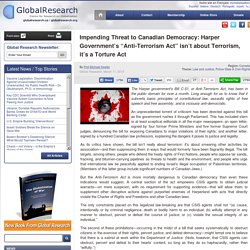

C-51: Crowdsourced report aims to stop Canada's slide into 'surveillance society' With the government's controversial proposed anti-terror law set to be passed into law within weeks, some of Bill C-51's most outspoken critics are supporting a "pro-privacy action plan" that calls for an end to warrantless and mass surveillance and more independent oversight.

READ: Canada's Privacy Plan – full report According to OpenMedia communications manager David Christopher, what he describes as "Canada's growing privacy deficit" has "alarming consequences for democracy. " "We're at a tipping point where we need to decide whether to continue evolving into a surveillance society, or whether to rein in the government's spying apparatus," he notes in the release accompanying the report. "This report outlines common sense steps to strengthen privacy safeguards for all of us.
"
Ahmad Saeid: Terrorism bill C-51 only creates more insecurity. Like millions of people across Canada, I was shocked by the news that the House of Commons passed Bill C-51 this Wednesday (May 6).

The authorities this proposed law gives to Canada’s spy agency, without any checks and balances, are only comparable to those found in the most horrific of dictatorships in Third World countries. The bill, as it stands today, is a tool that allows the government to act away from any legal scrutiny, and takes the Canadian justice system and the Charter of Rights and Freedoms out of reach of Canadian citizens. As a Muslim blogger, the part about encouraging terrorism “in general” is particularly disturbing for me. Let’s say I write a blog post expressing my views as a Muslim on any current world event, and someone in CSIS finds that my opinion is “in general” supporting or encouraging terrorism, what then? How can I be absolutely sure no one at CSIS will have an interpretation that my text is “in general” supportive of terrorism? Impending Threat to Canadian Democracy: Harper Government’s “Anti-Terrorism Act” isn’t about Terrorism, it’s a Torture Act. The Harper government’s Bill C-51, or Anti-Terrorism Act, has been in the public domain for over a month.

Long enough for us to know that it subverts basic principles of constitutional law, assaults rights of free speech and free assembly, and is viciously anti-democratic. An unprecedented torrent of criticism has been directed against this bill as the government rushes it through Parliament. This has included stern or at least sceptical editorials in all the major newspapers; an open letter, signed by four former Prime Ministers and five former Supreme Court judges, denouncing the bill for exposing Canadians to major violations of their rights; and another letter, signed by a hundred Canadian law professors, explaining the dangers it poses to justice and legality. As its critics have shown, the bill isn’t really about terrorism: it’s about smearing other activities by association—and then suppressing them in ways that would formerly have been flagrantly illegal. It seems that Mr.
On C-51, ‘just trust us’ doesn’t cut it anymore. More from Andrew Mitrovica available here.

Richard Fadden looks like a serious fellow who likes serious jobs. These days, the silver-haired, sober-sounding public servant is Stephen Harper’s national security advisor. It’s a big job with big responsibilities — primarily keeping the prime minister abreast of potentially combustible national security and geopolitical issues. Before his current gig, Fadden was deputy minister of national defence and director of Canada’s spy service, CSIS. Last week, Fadden appeared before a Senate committee examining Bill C-51, the government’s so-called ‘anti-terror’ legislation.
s243a@Delicious. Elizabeth May condemns Bill C-51, saying it would create a secret police force. Today in Parliament, the leader of the Green party, Elizabeth May, criticized Bill C-51 as being so "overbroad" that it "could apply to anything".

The legislation, which was tabled on January 30, would expand the mandate of the Canadian Security Intelligence Service to permit it to disrupt radical websites and apply for court orders to remove terrorist propaganda from the Internet. May told MPs that she agrees with a critical Globe and Mail editorial today, which was entitled "Stephen Harper's secret policeman bill". "This parliament must not allow the Conservatives to turn CSIS into a secret police force," May declared. Then she asked Public Safety Minister Steven Blaney if the Conservatives' new antiterrorism bill "will apply to nonviolent civil disobedience, such as that against pipelines?
" Blaney didn't directly answer her question. NDAA.